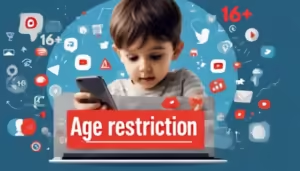A Bold Legislative Move Towards Online Child Safety – Social Media Age Restriction Bill passed for 16 under users
Taking a drastic step towards protecting the country’s children from the dark alleys of the cyber world, the Senate of Pakistan has tabled the “Social Media (Age Restriction for Users) Bill 2025.” The bill, as proposed, seeks to bar users under the age of 16 from registering or holding social media accounts on all social media platforms in operation within the country.
Sponsored by Senators Sarmad Ali and Masroor Ahmed, the bill is a reaction to growing fears of **cyberbullying, online exploitation, and the psychological effects of abusive content on vulnerable young minds.

The Drive Behind the Bill
As its authors point out, the internet as a repository of information and world connectivity has also become a breeding ground for harassment, manipulation, and mental illness most notably for minors. Since children are accessing social media at younger and younger ages, there is no governing protection in place.
Senator Sarmad Ali underscored that the intended age limit is not aimed at restricting freedom, but to create a shield digital boundary for minors who are not old enough to fully comprehend the repercussions of their internet behavior.
Strict Penalties for Non-Compliance
The bill is not merely a symbolic token of intent it has serious fangs. Anyone or any entity who is convicted of helping a minor create a social media account can be punished with a fine of up to Rs 5 million and six months’ jail time.
To facilitate enforcement of this legislation, the Pakistan Telecommunication Authority (PTA) will be at the forefront. The PTA will identify and delete accounts managed by users under the age of 16, in coordination with the social media platforms to guarantee compliance.
Learning from Global Models
Pakistan is not followed by others here. Australia and New Zealand are some countries which have already passed similar bills, promoting age verifications and better controls on minors’ internet usage. These global precedents have proved that age-restricted access, when applied in the right manner, can effectively minimize exposure to improper or harmful content for minors.
By following these international standards, Pakistan is rising as a responsible digital nation, acknowledging that technology has the ability to empower while also needing to be controlled in order to safeguard.
Public Response: Applause and Caution
The bill has created a controversy among parents, teachers, digital rights campaigners, and technology experts. Most parents have welcomed the move, referencing their own battle in shielding children from addictions on the internet and child-predatory content.
But digital rights organizations warn that implementation is going to be crucial. They call for a clear age-verification process that is respectful of user privacy but still succeeds in its protective objectives. There are also concerns about potential overreach and the misuse of information if enforcement is not balanced.
Implications of Young People’s Activities
Though the “Social Media Age Restriction Bill Pakistan” remains pending final parliamentary approval, its presentation presents a turning point in the nation’s digital policymaking. It is an imperative demand for accountable internet management, not only access, but safety and responsibility as well.
As the globe deals with the implications of young people’s activities in the digital space, Pakistan’s action has the potential to set the stage for more far-reaching discussions on tech literacy, parental controls, and ethical platform design.
Follow Pakistan Updates for live updates, policy changes, and digital evolution governing the country.




